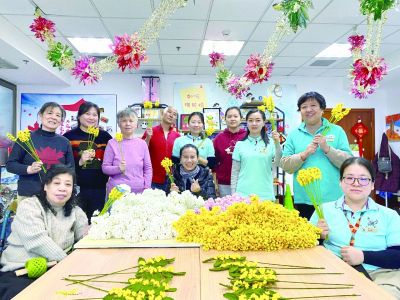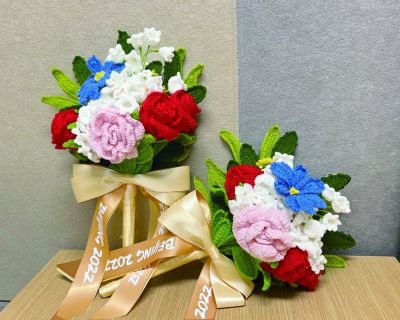A workshop for cultural and creative products at Beijing Hope House, a rehabilitation center for people with spinal cord injuries, was assigned an unexpected task in late August last year – it was tasked with creating bouquets that will be presented to medalists at the Beijing 2022 Olympic and Paralympic Winter Games.

Photo shows Tang Zhanxin (C) and her team members. (Photo/China Women’s News)
With support from the Beijing Disabled Persons’ Federation, the center was founded in 2014 by Tang Zhanxin, who lost the ability to walk after a tragic car accident.
“When the federation revealed that our workshop was picked to create the bouquets for Beijing 2022, I felt very surprised and lucky,” Tang said.
The bouquets are not made of fresh flowers, but of crocheted ones instead. These crocheted woolen bouquets will not wither and are produced with techniques listed as an intangible cultural heritage in China.
According to the original design, each bouquet features six types of flowers, including a rose that stands for friendship, a Chinese rose for perseverance, a lily of the valley for happiness, a hydrangea for unity, a laurel for victory, and an olive for peace. Tang suggested adding blue-colored calliopsis to the bouquets for the Paralympic Games, as calliopsis conveys the strength of persons living with disabilities. Her suggestion would later go on to be adopted.

Photo shows woolen bouquets for the Beijing 2022 Olympic and Paralympic Winter Games. (Photo/China Women’s News)
However, it’s an arduous task for Tang, as she had to complete hundreds of bouquets in just a few months. Tang established a team of more than 150 people living with disabilities accompanied by their family members. At first, only several team members possessed the skills for crocheting the flowers, so they quickly got to work tutoring the others. In the end, Tang’s team crafted 500 bouquets altogether.
“It took us over 20,000 hours to complete the bouquets, as each bouquet needed 35 to 40 hours to craft. It’s a challenge, but we finished our mission,” Tang said.
She added that the challenge is also a good opportunity for her team. “We proved that we can compete with commercial teams,” she said.
Beijing Hope House has been committed to helping people with spinal cord injuries participate in social life just like “normal” people since its foundation. Tang introduced that the center helped 95 percent of the first batch of 50 disabled people live independently in their first year of operations. To date, the center has offered continued support for more than 800 people with spinal cord injuries.
The center has also helped people living with disabilities find jobs. Tang said that the center has a team of more than 120 disabled persons who provide services for China Mobile, a major telecommunications operator, and the team is highly praised by the company’s clients. In recent years, the center has also offered vocational training to over 1,500 persons living with disabilities.


